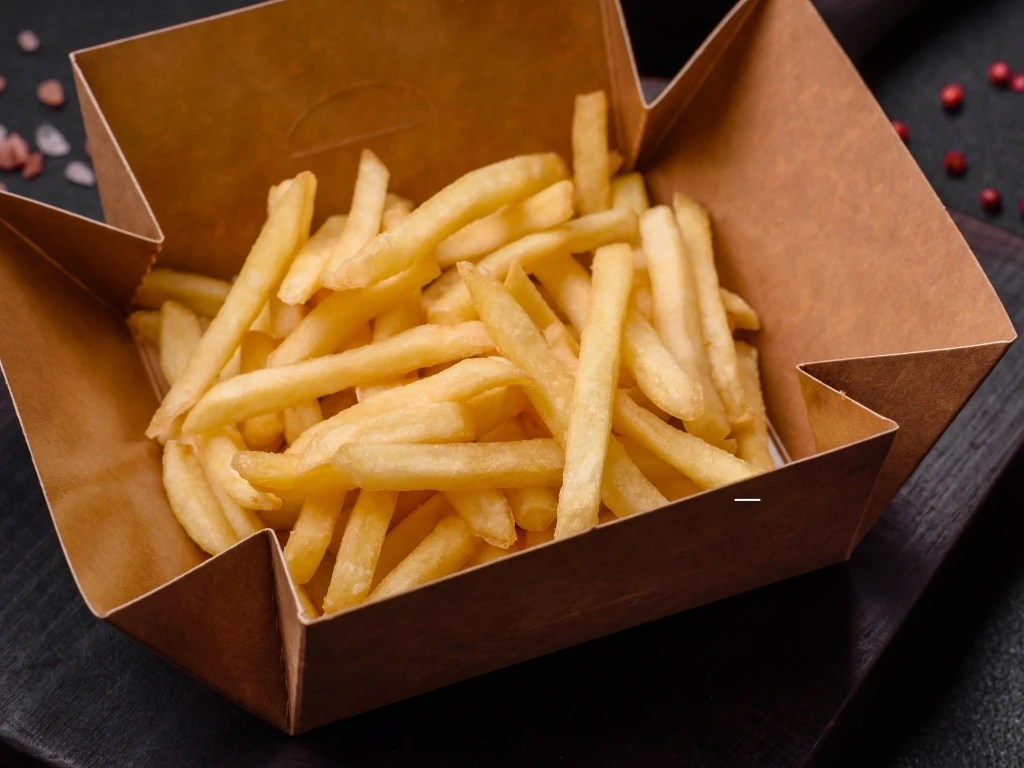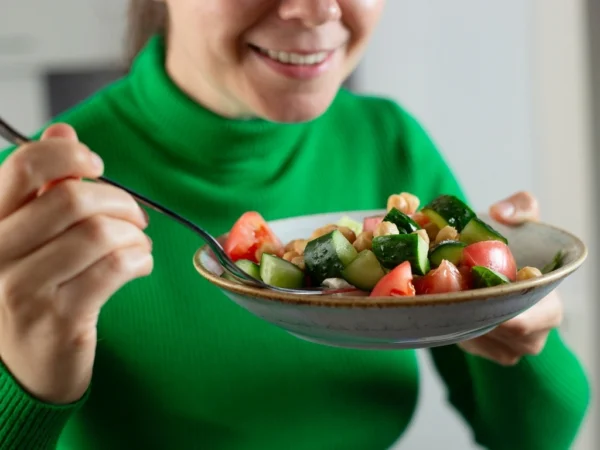Polycystic ovary syndrome (PCOS) affects at least one in 10 women of reproductive age, making it one of the most common hormonal conditions globally. To manage its symptoms and keep long-term risks at bay, it’s crucial to adopt healthy lifestyle changes, particularly a well-balanced PCOS diet. If you’ve been diagnosed with this condition, learning how to structure your meals to better support your body is an excellent place to start.

What is PCOS?
PCOS is a hormonal disorder that alters how the ovaries function. It’s typically caused by an excess of androgens, often referred to as male hormones, which women also naturally produce.
High levels of androgen can interfere with ovulation and hormonal balance. This results in symptoms like irregular periods, acne, thinning and eventual loss of hair on the scalp, and excessive facial or body hair. Challenges with fertility, particularly getting pregnant, are also common when managing PCOS.
Many people with PCOS experience insulin resistance, a condition where the body has trouble using insulin effectively. This can raise blood sugar levels and contribute to weight gain and visible skin changes (such as dark patches or skin tags).
Because its symptoms resemble those of other conditions, diagnosing PCOS isn’t always straightforward. Most gynecologists use a process of elimination, wherein they first rule out other potential causes of these symptoms before confirming a PCOS diagnosis. As a result, the condition is frequently underdiagnosed or misdiagnosed.
How does diet affect PCOS?
What you eat with PCOS can directly impact how you experience its symptoms. Since insulin resistance is a key feature of this condition, your diet can dictate how your body regulates insulin and, by extension, how it processes hormone levels like testosterone.
When insulin isn’t used effectively, your body produces more of it. This can raise androgen levels, which may worsen symptoms like weight gain, irregular periods, and hair thinning. This makes nutrition a powerful tool for managing PCOS.
The best PCOS diet focuses on whole foods and keeping blood sugar stable. Prioritizing high-fiber vegetables, lean proteins, and healthy fats — while limiting refined carbohydrates and added sugars — can reduce inflammation and support better insulin function. To minimize blood sugar spikes, pair carbs with protein or fiber for slower digestion.
Timing your meals properly is also a critical factor. Eating meals consistently during the day can improve your energy and hormone regulation because it supports blood sugar stability. On the other hand, skipping meals or relying on fad diets can disrupt your metabolism and worsen symptoms.
By building your meals around nutrient-rich and expert-approved PCOS dietary guidelines, you can better regulate insulin, achieve hormonal balance, and feel more in control of your health.
What should you eat on a PCOS diet?
While there’s no single diet that works for everyone, there are certain foods that help with PCOS much more significantly than others, especially those that control blood sugar, reduce inflammation, and balance hormones.

Here are five food groups you can stock up on for an easy but well-rounded PCOS diet:
High-fiber vegetables and fruits
Fiber slows digestion and regulates blood sugar, which is key for managing insulin resistance. It also helps you stay fuller longer and promotes estrogen metabolism, which can balance out elevated androgens. To increase your fiber intake, consider adding broccoli, Brussels sprouts, cauliflower, spinach, kale, berries, apples, and pears to your PCOS diet.
Not a huge fan of greens? PCOS and protein shakes can be a great match. Try blending these ingredients into a smoothie, but be mindful of added sugars. Aim for whole, nourishing ingredients whenever possible.
Lean proteins
Lean protein like chicken, turkey, fish, tofu, eggs, and even low-fat Greek yogurt keeps blood sugar levels stable, promotes muscle health, and reduces cravings that often accompany PCOS. All of these are essential for keeping energy levels consistent throughout the day.
Whole grains and legumes
Quinoa, brown rice, steel-cut or rolled oats, lentils, black beans, chickpeas, and other whole-grain foods contain complex carbohydrates that are digested more slowly than refined grains (e.g., white rice or white flour), preventing spikes in blood sugar and insulin. They’re also rich in fiber, iron, and magnesium — nutrients all linked to hormonal health.
Healthy fats
Healthy fats like omega-3 and 6, along with the increasingly popular omega-7, are vital nutrients with known anti-inflammatory properties that can also aid in hormone production and improve the body’s absorption of essential nutrients. Elevate your meals by adding in avocados, olive oil, flaxseeds, chia seeds, walnuts, and fatty fish like salmon.
Anti-inflammatory foods
Chronic inflammation can worsen symptoms of PCOS. Anti-inflammatory foods like turmeric, leafy greens, tomatoes, blueberries, ginger, and green tea provide antioxidants that help combat oxidative stress and provide metabolic balance.
Which foods should I limit on a PCOS diet?
Just as important as what you include in your diet is knowing what to limit. While a proper PCOS diet isn’t about restriction, knowing what to reduce allows you to make informed, consistent choices that align with your body’s needs.

Here are some examples of foods to cut back on:
Refined carbohydrates
Foods like white bread, white rice, white pasta, and baked goods made from refined flour digest quickly and cause sharp blood sugar spikes. This can worsen insulin resistance. Whenever possible, swap these for whole-grain alternatives like quinoa, brown rice, or whole wheat bread. Alternative pastas made from whole grains or legumes are another good option
Sugary beverages
Sodas, energy drinks, sweetened teas, and even store-bought fruit juices often contain high amounts of simple carbohydrates. These can spike blood sugar quickly and trigger cravings, making it harder to manage hormonal balance and PCOS symptoms.
Fried and processed foods
Crowd favorites like French fries and fried chicken, along with many packaged snacks, typically contain trans fats, excess sodium, and additives that can trigger or increase inflammation. Reducing your intake of these food items can help manage fatigue and skin-related symptoms brought about by PCOS, as well as keep your energy levels stable.
Red and processed meats
Sausages, bacon, deli meats, and similar products have been linked to inflammation and hormonal imbalances. If these are staples in your diet, consider cutting back and replacing them with leaner, anti-inflammatory protein sources.

High-glycemic vegetables and sweeteners
Are potatoes bad for PCOS if they’re not deep-fried? Although white potatoes are technically a complex carbohydrate, their high glycemic index (GI) makes them less ideal for regular consumption since they can cause rapid spikes in blood sugar when eaten alone. When consuming higher GI items like potatoes, make sure to pair them with food containing fiber, protein, or fat to support improved blood sugar regulation (e.g., chicken with broccoli and a baked potato).
The same caution should be applied to sweeteners like high-fructose corn syrup, which are also likely culprits for sharp blood sugar spikes. This may make you wonder: What about natural sweeteners, then? Is honey good for PCOS? In small amounts, these alternatives might be better than refined sugar, but moderation is still critical to observe.
Ultimately, managing PCOS doesn’t mean giving up your favorite foods. A balanced PCOS diet is all about making smarter swaps and building sustainable eating habits that genuinely support your health.
What to eat with PCOS: 3-day sample meal plan
To help you see how these food choices can come together in real life, we’ve prepared a three-day meal plan. Think of this plan as a flexible starting point for building meals that suit your lifestyle.

Using simple, whole-food ingredients and a focus on steady blood sugar, this PCOS diet plan offers strategies for promoting hormone health, boosting energy, and building your long-term wellness.
🥗 Get a 3-day sample meal plan you can start today (PDF)
Day 1
Breakfast
- 1 serving plain oatmeal with peanut butter or nuts
Lunch
- 1 serving whole wheat pita stuffed with chicken breast, shredded cheese, lettuce, tomato, and light sour cream
- 1 serving side salad (mixed greens with dressing on the side)
- 1 fruit of your choice
Dinner
- 1 serving healthy chicken parmesan (baked, breaded chicken with tomato sauce and reduced-fat cheese)
- 1 serving whole wheat pasta
- 1 serving fresh spinach salad with vinaigrette
Snacks
- 1 serving whole-grain toast with nut butter
Day 2
Breakfast
- 1 serving of whole wheat waffles with peanut butter
Lunch
- 1 serving individual-size whole grain pizza
- 1 serving side salad
Dinner
- 1 serving chicken quesadilla (whole wheat tortilla with chicken, cheese, salsa, light sour cream, and avocado slices)
- 1 serving side salad
Snacks
- 1 serving of cheese or tuna with whole-grain crackers
Day 3
Breakfast
- 1 serving of avocado toast with ricotta
- 1 mandarin orange
Lunch
- 1 serving whole grain wrap with deli meat, cheese, lettuce, tomato, and light mayo
- 1 cup strawberries
Dinner
- 1 serving pita pizza (whole wheat pita with tomato sauce, cheese, and lean meat)
- 1 serving side salad
Snacks
- 1 serving of veggie sticks with hummus

Connect with a Health Loft nutritionist to find the best PCOS diet for you
While general tips on PCOS nutrition can be a helpful starting point, remember that PCOS affects everyone differently. This is why a personalized approach is essential to managing your symptoms effectively and sustainably.
At Health Loft, you can work with registered dietitians who specialize in PCOS and hormone health, all through convenient one-on-one telehealth sessions. Together, you’ll build a PCOS diet plan that aligns with your lifestyle, goals, and body’s unique needs, empowering you to create long-lasting habits.
To make high-quality care more accessible, Health Loft is in-network with major insurance providers. Depending on your coverage, your virtual appointments may cost as little as $0 out-of-pocket.
Leave behind the restrictive rules and confusing advice. By joining Health Loft, you’ll receive the care you actually deserve: compassionate, evidence-based, and tailored to you. Discover how Health Loft can support your PCOS journey today.
This article was reviewed by Adrienne DePaul, MS, RDN. It is intended for informational purposes only and does not replace personalized nutritional advice.













